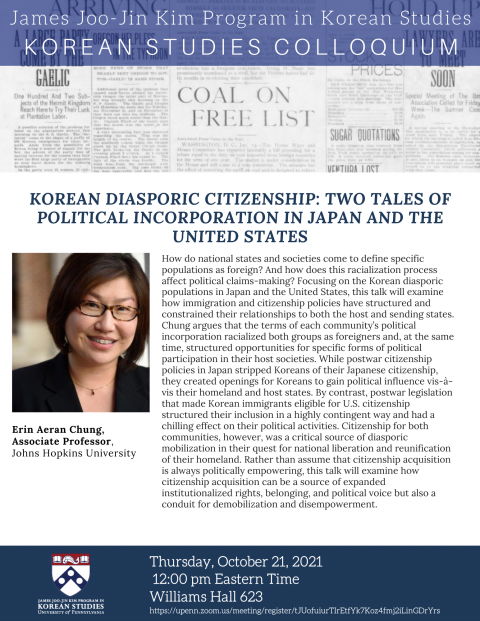
Korean Studies Colloquium
Williams Hall 623
Optional Zoom registration HERE
How do national states and societies come to define specific populations as foreign? And how does this racialization process affect political claims-making? Focusing on the Korean diasporic populations in Japan and the United States, this talk will examine how immigration and citizenship policies have structured and constrained their relationships to both the host and sending states. Chung argues that the terms of each community’s political incorporation racialized both groups as foreigners and, at the same time, structured opportunities for specific forms of political participation in their host societies. While postwar citizenship policies in Japan stripped Koreans of their Japanese citizenship, they created openings for Koreans to gain political influence vis-à-vis their homeland and host states. By contrast, postwar legislation that made Korean immigrants eligible for U.S. citizenship structured their inclusion in a highly contingent way and had a chilling effect on their political activities. Citizenship for both communities, however, was a critical source of diasporic mobilization in their quest for national liberation and reunification of their homeland. Rather than assume that citizenship acquisition is always politically empowering, this talk will examine how citizenship acquisition can be a source of expanded institutionalized rights, belonging, and political voice but also a conduit for demobilization and disempowerment.
Erin Aeran Chung is the Charles D. Miller Associate Professor of East Asian Politics in the Department of Political Science at Johns Hopkins University. She previously served as director of the East Asian Studies Program and co-director of the Racism, Immigration, and Citizenship (RIC) Program at Hopkins. She is the author of Immigration and Citizenship in Japan (Cambridge, 2010, 2014; Japanese translation, Akashi Shoten, 2012) and Immigrant Incorporation in East Asian Democracies (Cambridge, 2020), which received the 2021 Transnational Asia Book Award from the American Sociological Association Section on Asia and Asian America. She is also serving as co-President of the Migration and Citizenship Section of the American Political Science Association (2021-2023) and co-editor of the Politics and Society of East Asia Elements series at Cambridge University Press. Her research has been supported by grants from the Academy of Korean Studies, the Japan Foundation, the Japan Foundation Center for Global Partnership, the Social Science Research Council, and the American Council of Learned Societies.
 James Joo-Jin Kim Center for Korean Studies
James Joo-Jin Kim Center for Korean Studies